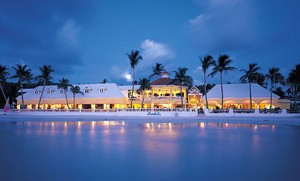I have never understood the appeal of Sandals Resorts. I’ve never been to one, so I can’t say for sure that my opinion is valid, but from the commercials they run it looks like all of the resorts are pretty much the same and are all the kind of all-inclusive, never-have-to-leave-the-resort facilities which never appealed to me. When I went to the Bahamas I wanted to feel like I was actually in the Bahamas, I wanted to explore the islands and go to different beaches and restaurants, not to stay within the bounds of one resort for a week. It’s not that the Sandals resorts aren’t nice, I’m sure they are, but they simply aren’t my style.
Earlier today, however, I was checking my Twitter feed and noticed that TIES (The International Ecotourism Society) had posted an article about Sandals Resorts that may lead me to reconsider my position caught my eye: “#Sandals unveils new eco-strategy “Earthguard” which reduces their footprint and increases benefits to host communities.” Apparently, Sandals paired with EarthCheck, a tourism benchmark and certification program that pairs with companies and governments to help increase sustainable and responsible tourism, to launch Earthguard, a new environmental management program. This is not a new partnership, but rather a strengthening of the existing relationship between Sandals and EarthCheck. This new program, Earthguard, will hopefully reduce the company’s environmental footprint while increasing the economic benefits to the host communities, thus making Sandals resorts more sustainable and responsible. The new program will also be transparent, an important step for any organization hoping to be more environmentally and economically responsible. Third-party auditors will come in regularly to ensure that natural resource consumption and waste are kept to a minimum, sustainable building techniques are implemented, and local community projects sponsored by the company are effective.
host communities.” Apparently, Sandals paired with EarthCheck, a tourism benchmark and certification program that pairs with companies and governments to help increase sustainable and responsible tourism, to launch Earthguard, a new environmental management program. This is not a new partnership, but rather a strengthening of the existing relationship between Sandals and EarthCheck. This new program, Earthguard, will hopefully reduce the company’s environmental footprint while increasing the economic benefits to the host communities, thus making Sandals resorts more sustainable and responsible. The new program will also be transparent, an important step for any organization hoping to be more environmentally and economically responsible. Third-party auditors will come in regularly to ensure that natural resource consumption and waste are kept to a minimum, sustainable building techniques are implemented, and local community projects sponsored by the company are effective.
But will the program as a whole be effective? Sandals is an all-inclusive resort, and as such true responsibility and sustainability is close to impossible. As I mentioned earlier, guests at these mega-resorts have almost no reason to ever leave the resort property, which not only cuts down on the experience of the trip but keeps the money tourists spend out of the local community. Why go out into the town for dinner or even hire a taxi to go to a local shop to buy souvenirs when all that is already on the property-and in some cases already paid for? All-inclusive resorts cater to the Western tourist, and so items like the soap, sheets, alcohol, and food tend to be imported rather than purchased within the local community—again, hurting the local economy. The resorts can sponsor local community projects, but if the tourist dollars the resort earns remain mostly out of the local economy than the projects won’t be terribly helpful. In the same vein, resorts can cut down on their environmental footprint and waste, but as long as they do not increase their economic footprint the tourism is not truly responsible or sustainable.
So I guess I won’t be changing my original position. It’s always good to see organizations take a step towards responsible tourism, but as far as steps go, this was a pretty small one. In fact, there probably isn’t a step a resort like Sandals can take that would be big enough to really make a difference. This move was probably more of an attempt to increase business by promoting eco awareness, which is so trendy these days. I’m not saying that it was bad for Sandals to have created EarthGuard, but simply that it will not be enough for the resort to meet its stated goal of responsible and sustainable tourism. It will never be enough unless the resort is able to create opportunities for the local community and to circulate money into the local economy.
Michelle Bovée is a SISGI Group Program and Research Intern focused on international affairs, economic development, and responsible tourism. To learn more about the SISGI Group visit www.sisgigroup.org


